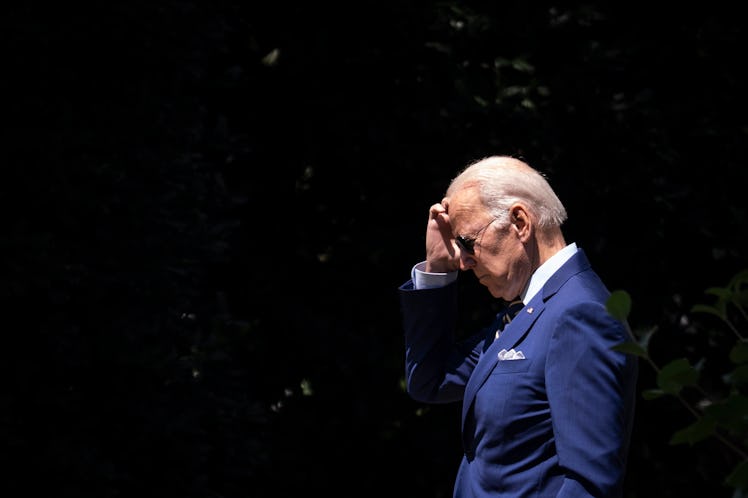Why Joe Biden’s Call To His Son Was Such Good Parenting
A parenting masterclass in three short statements.

Earlier this week, Fox News’ host Sean Hannity, in an attempt to smear the current president, aired audio of a 2018 voicemail that then-Senator Joe Biden left for his son Hunter asking him to get help. Hannity aimed to insinuate that Joe Biden knew that his son was actively using drugs around the time that Hunter purchased a firearm — which is a federal offense that prosecutors are considering charging Hunter Biden with.
While no material evidence has emerged on Hannity or elsewhere to show that Biden was aware of the gun purchase, Hannity did offer up solid evidence of a dad being a very good parent to a son in trouble — and a textbook case of how to talk to a child who is in trouble.
In the message, Biden says, 'It's Dad. I called to tell you I love you. I love you more than the whole world pal,' 'You gotta get some help. I know you don't know what to do, I don't either,' the elder Biden said in the message.
Much of the reaction on social media found empathy with the Bidens, with plenty of calls of this as an example of good parenting. But how, exactly? We break down three phrases within this short voicemail that are an excellent guide for any parents with a kid in crisis.
“I called to say I love you…”
Saying “I love you” is unambiguously supportive, but it also doesn’t exclude other conflicting emotions a parent might be feeling. You can love your kid and at the same time be angry about how they’re acting. You can love your kid and at the same time be sad about the situation they are in. You can love your kid and at the same time feel lost or confused or afraid or disgusted or any of the other emotions that surge in particularly painful moments.
But leading with love emphasizes the most important thing a kid needs to hear when they’re struggling or in crisis. With that one statement, Joe Biden aimed to diffuse any shame that would keep Hunter from feeling like he couldn't approach his dad for support and assured him that in that incredibly dark moment he didn’t have to be alone.
Addiction feeds on shame and isolation while the path to sobriety is paved with love and connection. Recovery can be a family affair and Joe Biden let his son know he was ready to walk that path with him.
“You gotta get some help...”
The plea is short, simple, and direct. It’s an admission that this fight is too big for Joe and Hunter Biden to win on their own. Even working together likely won’t be enough. They need a third party.
Eventually, Hunter Biden was going to encounter someone who could help him. Whether he was the first to reach out or it was someone reaching out to him, he’d have to make a decision as to whether or not he’d take the difficult step toward accepting help.
“I don't know what to do…”
Two of the most common parenting delusions are that parenting can be completely figured out and that the work of parenting ends when your kids reach adulthood. But the truth of the matter is that parenting is an evolving and unending riddle.
In admitting that he doesn't know what to do, Joe Biden offers common ground to his son. It’s a vulnerable admission of his own limitations that again shows his desire to be present and do the work with Hunter. Dad’s not swooping in with a multi-point plan to save the day, which is probably a good thing.
Sometimes life gets so dark that no matter how hard you strain, you can only see the next step. So take it. And let your loved ones who are struggling know that the next step is all you desire from them at that moment.
Regardless of how you feel about his politics, Joe Biden showed up as a great parent in a moment when his son desperately needed him. He’s not the only dad to have reached out when their kids were struggling with addiction. Ben Dryfus and Rex Chapman are two celebrities who felt compelled by this leaked voicemail to share how their dads supported them through their struggles.
This is not to say substance use disorders are a problem limited to the famous. Substance use disorders affect over 20 million Americans aged 12 and over, affecting families across the spectrum and perhaps even yours. If that’s the case, know you’re not alone and that the Partnership to End Addiction has free resources for Helping an Adult Family Member or Friend with a Drug or Alcohol Addiction.
This article was originally published on